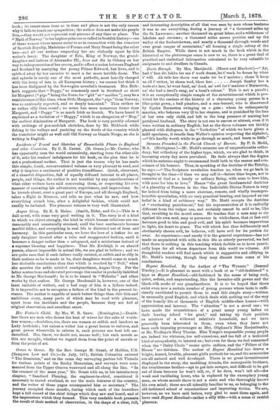Sermons Preached in the Parish Church of Barnes. By P.
G. Medd, (Rivingtons.)—Mr. Medd's sermons are of unquestionable ortho- doxy, but orthodoxy of the higher type, which, we are glad to think, is becoming every day more prevalent. He feels always that the dogma which he enforces ought to recommend itself both to the reason and con- science of his hearers. Thus, in speaking of the doctrine of the Trinity, he says :—" The Scripture revelation teaches us, when we go back in thought to the time—if time we may call it—before time began, not to conceive of God as a lonely or solitary Being, with none to love him, with none for him to love." Hence "the areat fundamental doctrine of a plurality of Persons in the One Indivisible Divine Nature is very far indeed from being a mere abstruse, remote, and wholly incompre- hensible speculation, with no very practical bearing, and imposed on our belief in a kind of arbitrary way." Mr. Medd accepts the doctrine of " everlasting punishment," but his representation of it is radically different from the vulgar one, and certainly cannot be said to be, like that, revolting to the moral sense. He teaches that a man may so sin against his own soul, may so persevere in wickedness, that at last evil becomes good to him and good evil, and his spirit becomes impervious to light, his heart to grace. The will which has thus deliberately and obstinately chosen evil, he believes, will have evil for its portion for ever. As experience—and surely it is the general experience—has not made us acquainted with wills in this life so utterly perverted, we feel that there is nothing in this teaching which forbids us to have practi- cally hope for all whose departure from this world we witness. All thoughtful readers will find much which is suggestive and edifying in Mr. Medd's teaching, though they may dissent from some of his conclusions.


































 Previous page
Previous page